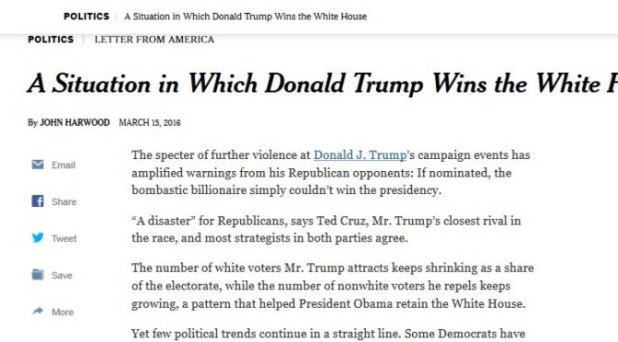Steve Sailer
VDARE
March 16, 2016
From the NYT:
A Situation in Which Donald Trump Wins the White House
By JOHN HARWOOD MARCH 15, 2016
The specter of further violence at Donald J. Trump’s campaign events has amplified warnings from his Republican opponents: If nominated, the bombastic billionaire simply couldn’t win the presidency.
“A disaster” for Republicans, says Ted Cruz, Mr. Trump’s closest rival in the race, and most strategists in both parties agree.
The number of white voters Mr. Trump attracts keeps shrinking as a share of the electorate, while the number of nonwhite voters he repels keeps growing, a pattern that helped President Obama retain the White House.
What the writer is trying to say is:
Over the years, the number of white voters — whom Mr. Trump attracts — keeps shrinking as a share of the electorate, while the number of nonwhite voters — whom he repels — keeps growing, a pattern that helped President Obama retain the White House.
But the way he phrased it makes it sound like something that’s happening day by day in 2016.
Yet few political trends continue in a straight line. Some Democrats have begun to cast a wary eye on Mr. Trump’s unconventional candidacy. And now a group of political demographers has calculated how Mr. Trump might pull off a narrow victory in November by slightly increasing the share of the white vote gained by Mitt Romney, the Republican nominee in 2012.
The group’s election model assumes continued growth among African-American, Latino, Asian-American and other nonwhite voters, as has occurred every four years since the Clinton era. It assumes that constituencies for both parties turn out at the same rates as in 2012.
Under those circumstances, the demographers found, an increase of four percentage points in the proportion of whites backing Mr. Trump could flip eight states that Mr. Obama carried in 2012. That would give Mr. Trump a slim edge of 49.7 percent to 48.6 percent in the popular vote and 315 electoral votes — 45 more than needed to win the White House.
“It’s a hard thing to pull off,” said Ruy Teixeira, a co-author of the analysis who works at the left-leaning Center for American Progress. “But I certainly wouldn’t rule it out.”
One reason such an outcome seems difficult is that Mr. Romney’s support among whites in 2012, measured at 59 percent in exit polls, was already high. Since the advent of exit polling, only Ronald Reagan in his 1984 re-election landslide has exceeded 60 percent among white voters nationally.
On the other hand, since 2012 the Democrats have been working hard to aggravate racial (and sexual) division in this country. (I personally think that the Obama campaign in 2012 trying to turn the sexes against each other might just be a worse thing than the Democrats racist rabble-rousing over various factual fiascos like Trayvon Martin, Michael Brown, and Freddie Gray, even though the the left’s projects have caused far more violence and gotten hundreds of blacks murdered by other blacks.)
Mr. Romney came close, running up his white vote totals in Southern states such as Mississippi (89 percent), Western states such as Arizona (66 percent) and Plains states such as Kansas (64 percent). But Mr. Obama was more competitive in the battle for the white vote elsewhere, including Colorado (44 percent), Wisconsin (48 percent), Minnesota (48 percent), Iowa (51 percent) and New Hampshire (51 percent).
The election model, which also involved analysts from the centrist Brookings Institution and the right-leaning American Enterprise Institute, shows that all five states Mr. Obama won would move from the Democratic column to the Republican, with an increase of four percentage points in Mr. Trump’s support among whites. So would Pennsylvania, Ohio and Florida, all by narrow margins.
What makes such a singular increase unlikely is the electoral equivalent of Newton’s Third Law, which declares that every action produces an equal and opposite reaction. If Mr. Trump’s emotion-charged appeals to white voters increase his performance among that demographic, political physics suggests the Democratic nominee might surpass the 80 percent support from nonwhite voters that Mr. Obama attracted in 2012.
Mr. Trump’s blunt-spoken assault on “political correctness,” which has proved especially popular among working-class white voters, could also produce a countervailing Republican hemorrhage among college-educated, more affluent, suburban white voters.
I would imagine the latter problem for Trump — the one among nice white people — is more severe than the problem among The Diverse, who tend to find Trump glamorous. (That doesn’t mean that they will vote for him, but Hillary has to be worried about minority male turnout.)
But, I’m sure the Democrats will try very hard to convince nice white people that a vote against Trump isn’t just a vote against nouveau riche bad taste, it’s really a vote for The Diverse (no matter what The Diverse actually feel about Trump personally.) Expect the Democrats to do their best to rile up middle class Diverse college students, along with any street thugs who want to join in, and blame it all on the Hitler of American white people, Donald Trump.
There should be no shortage of Steve Sailer material through November 2016.
If Trump wins the nomination, of course he has a long row to hoe to carry off this strategy. It’s fairly unlikely to work and has a sizable chance to wipe out Goldwater/McGovern style.
But then the GOP Establishment’s Jeb/Rubio Victory Through Amnesty strategy was always ridiculous, based on obvious fallacies about how the world works. And yet for 3 years, that’s all we heard about. Only now in 2016 is this alternative strategy being talked about in 2016, even though the math was self-evident all along.
 Daily Stormer The Most Censored Publication in History
Daily Stormer The Most Censored Publication in History



